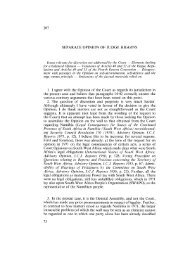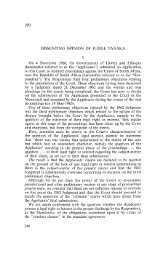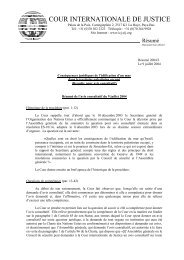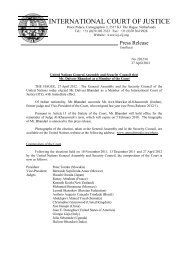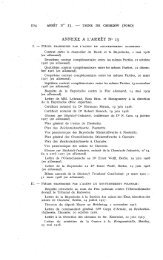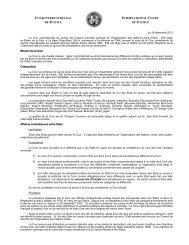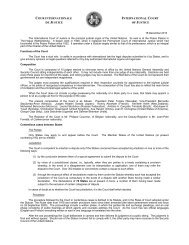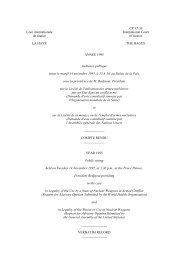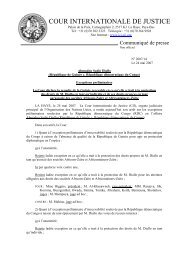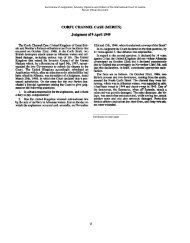botswana/namibia - Cour international de Justice
botswana/namibia - Cour international de Justice
botswana/namibia - Cour international de Justice
Create successful ePaper yourself
Turn your PDF publications into a flip-book with our unique Google optimized e-Paper software.
771. Map evi<strong>de</strong>nce prior to 1965 is inconclusive. After that date, British, Bechuanaland and<br />
Botswana maps clearly showed the boundary to <strong>de</strong>scend the northern channel. However, prior<br />
to this date there was no acquiescence by the British or Bechuanaland authorities; the Seiner<br />
map did not show a boundary line in the river and was never accepted as authoritative; the<br />
<strong>de</strong>piction of an intercolonial boundary along the southern edge of the Chobe River in the 1933<br />
British map was no more than a cartographic <strong>de</strong>vice and not an accurate location of the<br />
boundary which '<strong>de</strong>scends' the river as provi<strong>de</strong>d by the 1890 Anglo-German Agreement. The<br />
correspon<strong>de</strong>nce between the Bechuanaland Resi<strong>de</strong>nt Commissioner and the mapping<br />
authorities of South Africa in 1946 <strong>de</strong>monstrates that there was no acquiescence in the<br />
erroneous <strong>de</strong>piction of the boundary in the southern channel in the 1949 South African map,<br />
which in any event was published at a time when South Africa was seeking in high level<br />
correspon<strong>de</strong>nce to modify the legal status quo. South African authorities themselves<br />
recognised that the correct location of the boundary was in the northern channel in their<br />
military maps of 1978 and 1984.<br />
(viii) The Evi<strong>de</strong>nce relating to the Period since the In<strong>de</strong>pen<strong>de</strong>nce of Botswana in 1966<br />
772. The Namibian Memorial rounds off the chapter relating to 'acquiescence, acceptance and<br />
recognition' with a section covering 'the period of Botswana in<strong>de</strong>pen<strong>de</strong>nce' (pp.114-17, paras.<br />
280-86). The key assertion is simply that, after achieving in<strong>de</strong>pen<strong>de</strong>nce in 1966, 'almost two<br />
<strong>de</strong>ca<strong>de</strong>s passed before Botswana registered any formal protest or entered any formal claim<br />
with respect to Kasikili Island.' (Namibia Memorial, p.114, para. 281).<br />
773. This assertion does not <strong>de</strong>pend upon any evi<strong>de</strong>nce but upon a certain surrealist logic. The<br />
absence of 'any formal protest' is meaningless in legal terms unless the Botswana authorities<br />
believed that the South African Government was exercising sovereignty over the island. But<br />
there is no evi<strong>de</strong>nce of this. Moreover, the correspon<strong>de</strong>nce of the period 1948 to 1951 (see<br />
above, paras. 736-69) provi<strong>de</strong>s cogent evi<strong>de</strong>nce that the British authorities, both in London<br />
and in the Bechuanaland Protectorate, consi<strong>de</strong>red the northern channel to be the boundary in<br />
accordance with the Anglo-German Agreement. After in<strong>de</strong>pen<strong>de</strong>nce Botswana inherited the<br />
boundary by operation of law.<br />
774. The principle of inheritance of boundaries (Uti possi<strong>de</strong>tis) is recognised by the<br />
Government of Namibia (Memorial, page 114, para. 280), but illogically it is not consi<strong>de</strong>red<br />
applicable in relation to the boundary established by the Anglo-German Agreement.<br />
775. The Namibian Government offers an eccentric medley of evi<strong>de</strong>nce supposed to indicate<br />
the acquiescence of Botswana in an unproven exercise of sovereignty over the island by South<br />
Africa. In the first place, reference is ma<strong>de</strong> to South African military activity in respect of 'the<br />
bor<strong>de</strong>r area' and its '<strong>de</strong> facto authority over the area' (Namibia Memorial, pp.114-15, para.<br />
281). As the Government of Botswana has pointed out earlier in the present pleading (above,<br />
paras. 694-6), it is inappropriate to rely on such military activity as evi<strong>de</strong>nce of title.<br />
However, the significant point for present purposes is the absence of any evi<strong>de</strong>nce that South<br />
African patrolling involved possession of the island.<br />
776. In the second place, the Namibian Memorial invokes 'discussions' alleged to have taken<br />
place at 'the governmental level' in 1974-1975 (Memorial, page 115, para. 282). There is no<br />
record of such a meeting (see Chapter 1, paras. 60-61) and consequently it would be<br />
incautious to treat assertions based upon it as evi<strong>de</strong>nce.



